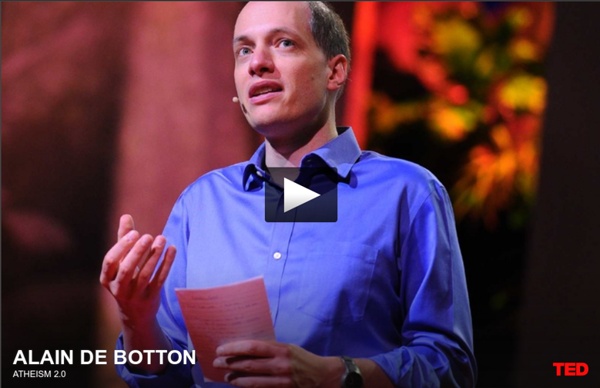



http://www.ted.com/talks/alain_de_botton_atheism_2_0.html
Videos Get Inspired – Best Inspirational Quotes J Krishnamurti on Choiceless Awareness and Thought Rob Beats Word Up [3/19/2014] The 10 Best TED Talks of 2011 Watching videos online is usually considered fun, but generally a waste of time. Not so with TED videos, which are uniformly interesting, educational, inspiring, and enjoyable. If you haven't spent much time (or any) checking out TED videos, you should – and to help with that, I've compiled what seem to be the very best 10 TED videos of 2011. It was a grueling task, combing through the cream of the crop on the TED site, but somebody had to do it.
Omniism New-Age Religious Use[edit] Omniism is a religious view that adopts the idea of Quantum superposition into an actively questioning agnosticism in a way that results in a philosophy similar to Quakers and the Society of Friends, but with no affiliation, real or stated, to any branch of any existing religion (as Quakers are with Christianity and Protestantism) beyond Its follower's personal decisions. Its core philosophy is that all religions may be correct and incorrect in their views of the structure of the universe concurrently. It allows and encourages the Omniist to explore all possible religious systems of belief and practice as though they were true, but asks that they be approached with skepticism.
Religious pluralism Religious pluralism is an attitude or policy regarding the diversity of religious belief systems co-existing in society. It can indicate one or more of the following: As the name of the worldview according to which one's religion is not the sole and exclusive source of truth, and thus the acknowledgement that at least some truths and true values exist in other religions.As acceptance of the concept that two or more religions with mutually exclusive truth claims are equally valid. This may be considered a form of either toleration (a concept that arose as a result of the European wars of religion) or moral relativism.The understanding that the exclusive claims of different religions turn out, upon closer examination, to be variations of universal truths that have been taught since time immemorial. Definition and scope[edit]
Norway’s Greatest Vulnerability Is Also Its Greatest Strength The unspeakable horror of this weekend’s massacre in Norway is exaggerated exponentially by terrorist Anders Breivik’s abuse of one of civil society’s most distinctive features: the trust that the public places in law enforcement. And Norway may be particularly vulnerable to such a breach, as a country with a particularly deep faith in its the integrity of its institutions. Norway’s best civil qualities, in this case, also made it most vulnerable to the worst impulses of this killer.
What is Pluralism? The plurality of religious traditions and cultures has come to characterize every part of the world today. But what is pluralism? Here are four points to begin our thinking: Prattyasamutpda Pratītyasamutpāda (Sanskrit: प्रतीत्यसमुत्पाद; Pali: पटिच्चसमुप्पाद paṭiccasamuppāda) is commonly translated as dependent origination or dependent arising. The term is used in the Buddhist teachings in two senses: On a general level, it refers to one of the central concepts in the Buddhist tradition—that all things arise in dependence upon multiple causes and conditions.On a specific level, the term is also used to refer to a specific application of this general principle—namely the twelve links of dependent origination. Etymology[edit] Pratityasamutpada (Sanskrit: प्रतीत्यसमुत्पाद) consists of two terms: pratitya: "having depended"samutpada: "arising", "rise, production, origin"[web 1]
Buddhism Religion founded by the Buddha Buddhism (, ) is an Indian religion based on a series of original teachings attributed to Gautama Buddha. It originated in ancient India as a Sramana tradition sometime between the 6th and 4th centuries BCE, spreading through much of Asia. It is the world's fourth-largest religion[3] with over 520 million followers, or over 7% of the global population, known as Buddhists.[6] Buddhism encompasses a variety of traditions, beliefs and spiritual practices largely based on the Buddha's teachings (born Siddhārtha Gautama in the 5th or 4th century BCE) and resulting interpreted philosophies. Two major extant branches of Buddhism are generally recognized by scholars: Theravāda (Pali: "The School of the Elders") and Mahāyāna (Sanskrit: "The Great Vehicle").
Why Americans doubt man-made climate change - Inside Story: US 2012 It was 42 years ago that the first Earth Day was organised in the US, drawing millions of Americans to rallies across the country calling for a sustainable environment. Some consider that day to be the birth of the modern environmentalist movement in the US. Today the day is marked by millions around the world but its impact in the US seems to have fizzled, with only dozens turning out at the National Mall in Washington DC on Sunday. While the first Earth Day helped lead to the establishment of the US Environmental Protection agency, this year it was largely ignored by politicians and the public. The issue of climate change has barely come up on the US presidential campaign trail. And for the Republicans it is something they would rather distance themselves from.
Jason Lisle is a dipstick, therefore I can use him to check my oil levels. Aw, poopy…there I go again, getting my words all mixed up. Where did this (extremely understandable) error come from? Let’s check the dictionary: dipstick Noun 1. Education is Ignorance, by Noam Chomsky (Excerpted from Class Warfare) DAVID BARSAMIAN: One of the heroes of the current right-wing revival... is Adam Smith. You've done some pretty impressive research on Smith that has excavated... a lot of information that's not coming out. You've often quoted him describing the "vile maxim of the masters of mankind: all for ourselves and nothing for other people." NOAM CHOMSKY: I didn't do any research at all on Smith. I just read him. There's no research.
About Us A Skeptical Manifesto A Skeptical Manifesto The following is excerpted from Why People Believe Weird Things: Pseudoscience, Superstition, and Other Confusions of Our Time by Michael Shermer, 1997, W. H.